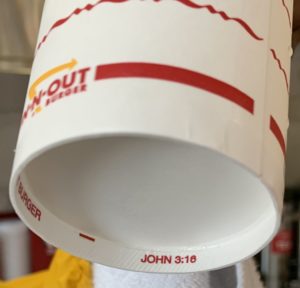If you’re not in a group of people studying the Bible together, you should be. A good Sunday school class, Bible study or small group is one of the best ways to grow and strengthen your walk with Christ.
What makes a Sunday school class, Bible study or small group good? Our class discussion during Sunday school July 3 at First Baptist Church in Plano offers an example.
Examining the use and misuse of Scripture
Our class is midway through a study of Jesus’ wilderness temptations as recorded in Matthew 4. In Matthew’s account, the devil’s second temptation includes a quote from Psalm 91:11-12.
“The devil took him to the holy city and had him stand on the highest point of the temple.
‘If you are the Son of God,’ he said, ‘throw yourself down. For it is written:
He will command his angels concerning you,
and they will lift you up in their hands,
so that you will not strike your foot against a stone’” (Matthew 4:5-6).
Jesus responded in kind, quoting Deuteronomy 6:16: “It is also written: ‘Do not put the Lord your God to the test’” (Matthew 4:7).
We discussed the nefariousness of the devil using Scripture to tempt Jesus and the effectiveness of such uses, particularly among followers of Jesus.
Class ended with a discussion of two marketing efforts employing Scripture. The first seemed innocuous, though a little confusing. The second generated a livelier discussion.
Sign up for our weekly edition and get all our headlines in your inbox on Thursdays
The use and misuse of Scripture in marketing
We were shown two images—a photo of an In-n-Out Burger drink cup and a tweet of a boy holding an assault rifle.

A photo from the internet shows “John 3:16” printed on the underside of an In-n-Out cup. I went to In-n-Out Sunday afternoon to get a drink so I could verify the internet wasn’t lying. It wasn’t.
We were asked if this is an appropriate use of John 3:16—“For God so loved the world that he gave his one and only Son, that whoever believes in him shall not perish but have eternal life.”
John 3:16 has nothing to do with soda or tea, but it could be stretched to relate to Jesus as the “living water” (John 4). But we didn’t talk about that.
Our questions revolved around why a company would print a Scripture reference on a drink cup, and why a company that clearly wants to be connected to the Bible and/or Jesus would hide that reference on the bottom of a cup. Some noted their dislike of companies targeting Christians with Bible verses and fish symbols. What do you think? Is this an appropriate use of Scripture?

In the second image, a young boy holds an assault rifle—the same one used by the Uvalde mass shooter—while a man’s hand points in the direction of the gun. Above the image is the following Bible verse, without the reference: “Train up a child in the way he should go, and when he is old, he will not depart from it.” The reference is Proverbs 22:6.
Daniel Defense, a firearms manufacturer in Georgia, tweeted this on May 16, 2022. The tweet was shared widely on Twitter, spurring fierce backlash. Daniel Defense finally hid or deleted the tweet.
Those who responded during class were unanimous in their opposition to the tweet. Some were horrified by the whole thing. Others were repulsed that a child was holding an assault rifle. Even those most supportive of gun rights took issue with the tweet.
While there was some debate about the appropriateness of a private company using an evangelistic Bible verse on a drink cup, there was no debate about the inappropriateness of using Proverbs 22:6 to sell guns.
Our teacher wrapped up by suggesting the proper use of Scripture is “for teaching, rebuking, correcting and training in righteousness, so that the servant of God may be thoroughly equipped for every good work” (2 Timothy 3:16-17).
We were asked if Scripture in either of the instances we discussed met Paul’s description of Scripture’s uses. What do you think? How does the use of John 3:16 and Proverbs 22:6 in the examples cited above train us in righteousness?
Characteristics of a good Bible class or group
Our Sunday school class isn’t perfect; none are. But our ability to engage in touchy discussions is an example of the characteristics of a good Sunday school class, Bible study or small group.
We have differing opinions in our class about just about everything, including politics. Even so, we are able to engage in difficult conversations, because we care about and for each other. This takes time, trust and a commitment to gentleness and kindness toward each other.
We also aren’t afraid to dive into thorny subjects. The Bible doesn’t skirt difficult issues. Bible study shouldn’t either, though plenty of stories in the Bible do require appropriate caution when teaching children and individuals who have experienced trauma. Teachers and learners need to consider the whole of Scripture for the whole of life and discuss both honestly.
In our class, we can ask any question, and we accept “I don’t know” for an answer. A confident teacher can allow learners to ask difficult questions, and teachers and others in the group need to allow time for adequate discussion. The people in the room are always more important than the lesson.
If Scripture is to be used properly—to teach, rebuke, correct and train in righteousness so we may be thoroughly equipped for every good work—then every Sunday school class, Bible study or small group should exhibit the three characteristics just described.
If you’re part of a Sunday school class, Bible study or small group and it’s not good, be part of making it good. It’s not all the responsibility of the teacher or church leadership.
What about your class? What makes it good? How can you make it better?
Eric Black is the executive director, publisher and editor of the Baptist Standard. He can be reached at eric.black@baptiststandard.com. The views expressed are those solely of the author.















We seek to connect God’s story and God’s people around the world. To learn more about God’s story, click here.
Send comments and feedback to Eric Black, our editor. For comments to be published, please specify “letter to the editor.” Maximum length for publication is 300 words.